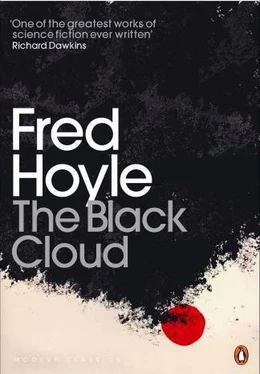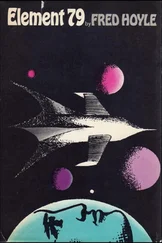Fred Hoyle - The Black Cloud
Здесь есть возможность читать онлайн «Fred Hoyle - The Black Cloud» весь текст электронной книги совершенно бесплатно (целиком полную версию без сокращений). В некоторых случаях можно слушать аудио, скачать через торрент в формате fb2 и присутствует краткое содержание. Жанр: Фантастика и фэнтези, на английском языке. Описание произведения, (предисловие) а так же отзывы посетителей доступны на портале библиотеки ЛибКат.
- Название:The Black Cloud
- Автор:
- Жанр:
- Год:неизвестен
- ISBN:нет данных
- Рейтинг книги:5 / 5. Голосов: 1
-
Избранное:Добавить в избранное
- Отзывы:
-
Ваша оценка:
- 100
- 1
- 2
- 3
- 4
- 5
The Black Cloud: краткое содержание, описание и аннотация
Предлагаем к чтению аннотацию, описание, краткое содержание или предисловие (зависит от того, что написал сам автор книги «The Black Cloud»). Если вы не нашли необходимую информацию о книге — напишите в комментариях, мы постараемся отыскать её.
The Black Cloud — читать онлайн бесплатно полную книгу (весь текст) целиком
Ниже представлен текст книги, разбитый по страницам. Система сохранения места последней прочитанной страницы, позволяет с удобством читать онлайн бесплатно книгу «The Black Cloud», без необходимости каждый раз заново искать на чём Вы остановились. Поставьте закладку, и сможете в любой момент перейти на страницу, на которой закончили чтение.
Интервал:
Закладка:
His main concern however was with the radio astronomy department. He chivvied John Marlborough and his colleagues into intensive observations of the approaching Cloud, south of Orion. It required a good deal of persuasion to get them started. The Cambridge equipment (for 21 cm work) had only just recently come into operation and there were many other observations that Marlborough wanted to make. But Kingsley eventually managed to get his own way without revealing his real purposes. And once the radio astronomers were fairly started on the Cloud the results that came in were so startling that Marlborough needed no persuasion to continue. Soon his team were working twenty-four hours continuously round the clock. Kingsley found himself hard put to it to keep up in reducing the results and in distilling significance out of them.
Marlborough was elated and excited when he lunched with Kingsley on the fourth day. Judging the time to be ripe, Kingsley remarked:
“It’s clear that we ought to aim at publishing this new stuff pretty soon. But I think it might be desirable to get someone to confirm. I’ve been wondering about whether one or other of us shouldn’t write to Leicester.”
Marlborough swallowed the bait.
“A good idea,” he said. “I’ll write. I owe him a letter, and there are some other things I want to tell him about.”
What Marlborough really meant, as Kingsley well knew, was that Leicester had got in first on one or two matters recently and Marlborough wanted the opportunity to show him that he, Leicester, wasn’t the only fish in the sea.
Marlborough did in fact write to Leicester at the University of Sydney, Australia, and so for good measure (and unknown to Marlborough) did Kingsley. The two letters contained much the same factual material but Kingsley’s also had several oblique references, references that would have meant much to anyone who knew of the threat of the Black Cloud, which of course Leicester did not.
When Kingsley returned to College after his lecture next morning an excited porter shouted after him:
“Dr Kingsley, sir, there’s an important message for you.”
It was from the Home Secretary to the effect that he would be glad to be favoured by an interview with Professor Kingsley at three that afternoon. “Too late for lunch, too early for tea, but he probably expects to make a good meal for all that,” thought Kingsley.
The Home Secretary was punctual, extremely punctual. Trinity clock was striking three when the self-same porter, still excited, showed him into Kingsley’s rooms.
“The Home Secretary, sir,” he announced with a touch of grandeur.
The Home Secretary was both brusque and tactfully subtle at the same time. He came to the point straight away. The Government had naturally been surprised and perhaps a little alarmed at the report they had received from the Astronomer Royal. It was widely appreciated how much the report owed to Professor Kingsley’s subtle powers of deduction. He, the Home Secretary, had come specially to Cambridge with a two-fold purpose: to compliment Professor Kingsley on the swiftness of his analysis of the strange phenomena that had been brought to his notice, and to say that the Government would much appreciate being in constant touch with Professor Kingsley so that they might have the full benefit of his advice.
Kingsley felt he could do little but demur at the eulogy and offer with the best grace he could muster to give the best help that he could.
The Home Secretary expressed his delight, and then added, almost as an afterthought, that the Prime Minister himself had given close thought to what Professor Kingsley might think a small point, but which he, the Home Secretary, felt nevertheless to be a point of some delicacy: that for the immediate present awareness of the situation should be closely confined to a very select few, in fact to Professor Kingsley, to the Astronomer Royal, the Prime Minister, and to the Inner Cabinet, of which for this purpose he, the Home Secretary, was considered a member.
“Cunning devil,” thought Kingsley, “he’s put me just where I don’t want to be. I can only get out of it by being damnably rude, and in my own rooms too. I’d better try to warm things up by degrees.”
Aloud he said:
“You may take it that I understand and fully appreciate the naturalness of your wish for secrecy. But there are difficulties that I think ought to be appreciated. First, time is short: sixteen months is not a long time. Secondly, there are quite a number of things that we urgently need to know about the Cloud. Thirdly, those things will not be found out by maintaining secrecy. The Astronomer Royal and I could not possibly do everything alone. Fourthly, secrecy can in any case only be temporary. Others may follow the lines of reasoning that are contained in the Astronomer Royal’s report. At most you can expect only a month or two’s grace. In any case by the late autumn the situation will be plain to anyone who cares to glance up at the sky.”
“You misunderstand me, Professor Kingsley. I explicitly referred to the immediate present just now. Once our policy is formulated we intend to go ahead full steam. Everyone whom it is necessary to inform of the Cloud will be informed. There will be no unnecessary silence. All we ask for is a strict security in the interim period until our plans are ready. We naturally do not wish the matter to become public gossip before we have marshalled our forces, if I may use such a military term in this connexion.”
“I very much regret, sir, that all this does not sound to me very well considered. You speak of formulating a policy and of then pressing ahead. This is very much a matter of the cart getting before the horse. It is impossible, I assure you, to formulate any worthwhile policy until further data become available. We do not know for instance whether the Cloud will strike the Earth at all. We do not know whether the material of the Cloud is poisonous. The immediate tendency is to think that it will get very cold when the Cloud arrives, but it is just possible that the reverse may happen. It may get too hot. Until all these factors become known, policy in any social sense is meaningless. The only possible policy is to collect all relevant data with the least delay, and this, I repeat, cannot be done while a really strict secrecy is maintained.”
Kingsley wondered how long this eighteenth-century sort of conversation would continue. Should he put the kettle on for tea?
The climax was rapidly approaching, however. The two men were mentally too dissimilar for more than a half hour of conversation between them to be possible. When the Home Secretary talked, it was his aim to make those to whom he was talking react according to some pre-arranged plan. It was irrelevant to him how he succeeded in this, so long as he succeeded. Anything was grist to the mill: flattery, the application of common-sense psychology, social pressure, the feeding of ambition, or even plain threats. For the most part, like other administrators, he found that arguments containing some deep-rooted emotional appeal, but couched in seemingly logical terms, were usually successful. For strict logic he had no use whatever. To Kingsley on the other hand strict logic was everything, or nearly everything.
Now the Home Secretary made a mistake.
“My dear Professor Kingsley, I fear you underestimate us. You may rest assured that when we make our plans we shall prepare for the very worst that can possibly overtake us.”
Kingsley leaped.
“Then I fear you will be preparing for a situation in which every man, woman, and child will meet their death, in which not an animal, nor any plant will remain alive. May I ask just what form such a policy will take?”
The Home Secretary was not a man to offer a staunch defence to a losing argument. When an argument led him to an awkward impasse he simply changed the subject and never referred to the old topic again. He judged the time ripe to change his style, and in this he made a second, and bigger, mistake.
Читать дальшеИнтервал:
Закладка:
Похожие книги на «The Black Cloud»
Представляем Вашему вниманию похожие книги на «The Black Cloud» списком для выбора. Мы отобрали схожую по названию и смыслу литературу в надежде предоставить читателям больше вариантов отыскать новые, интересные, ещё непрочитанные произведения.
Обсуждение, отзывы о книге «The Black Cloud» и просто собственные мнения читателей. Оставьте ваши комментарии, напишите, что Вы думаете о произведении, его смысле или главных героях. Укажите что конкретно понравилось, а что нет, и почему Вы так считаете.












